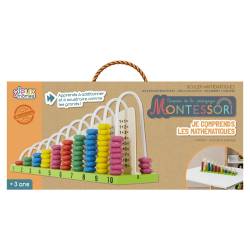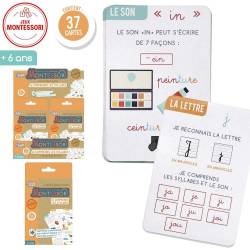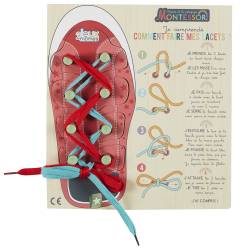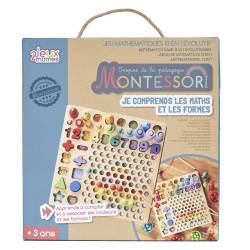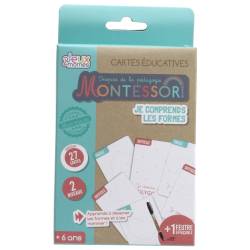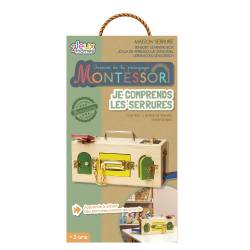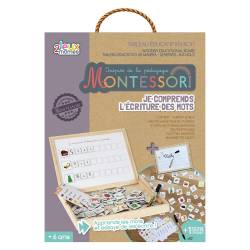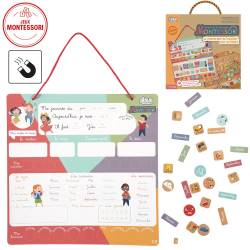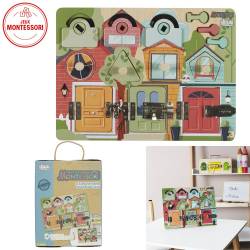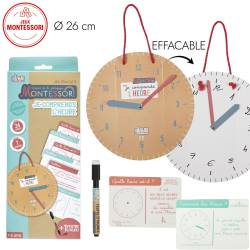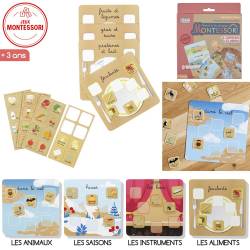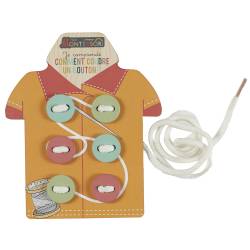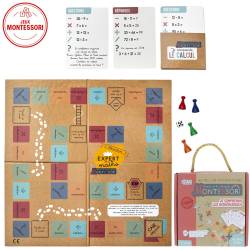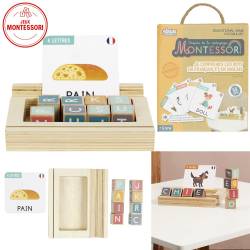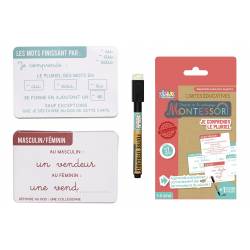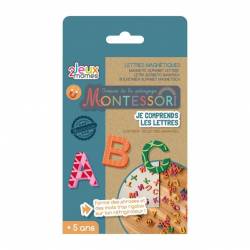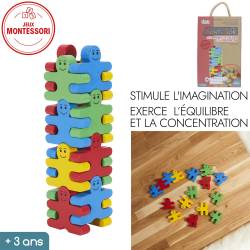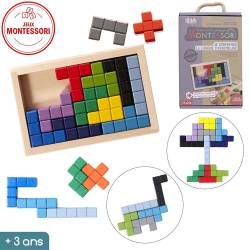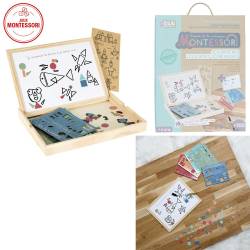No products
The Importance of Montessori Wooden Toys for Children's Development
Montessori toys are designed to encourage self-directed learning in children, focusing on natural materials, particularly wood, to promote a healthy and safe play environment. The Montessori philosophy, developed by Maria Montessori, is based on the idea that children have an absorbent mind capable of intensive learning from an early age. This absorbent mind is the main driver of learning and develops particularly between 12 months and 6 years, during which Montessori toys are most beneficial.
Montessori Wooden Toys
Wooden toys are a central pillar of Montessori schools. Unlike plastic toys, wooden toys offer a natural texture and robustness that make them durable and resilient. They are not only eco-friendly but also aesthetically pleasing, bringing a warm and authentic touch to the child's play area. Montessori materials made of wood are varied, ranging from building blocks to puzzles and balance games, each designed to meet specific developmental needs.
Importance of Social Behavior
An essential aspect of Montessori toys is their ability to improve children's social behavior. The toys are often designed for group use, thus encouraging communication, sharing, and cooperation skills. Children learn to resolve conflicts, work together, and follow rules, which are crucial skills for their social and emotional development.
Development of Movement Coordination
Educational games Montessori are specially designed to develop movement coordination in young children. Activities like threading beads, stacking blocks, or manipulating objects of different shapes and sizes help children refine their fine motor skills. This not only allows them to better control their movements but also to develop their concentration and ability to focus on a specific task.
The Role of Montessori Educators
Montessori educators play a crucial role in guiding children in their learning. They carefully observe the interests and individual needs of the children to offer suitable activities. Educators use Montessori materials to create enriching and stimulating learning experiences. They encourage autonomy and self-confidence by allowing children to freely choose their activities and perform them at their own pace.
Montessori Games for 12 Months and Up
For children from 12 months, Montessori toys offer activities adapted to their stage of development. At this age, the child begins to explore their environment more actively and needs toys that stimulate their senses and curiosity. Wooden toys such as rattles, stacking rings, and simple puzzles are ideal for this age. They help develop fine motor skills, hand-eye coordination, and problem-solving abilities.
The Absorbent Mind of Children
One of the key concepts of the Montessori method is the absorbent mind. Maria Montessori observed that young children have a natural ability to absorb information and skills from their environment almost unconsciously. Montessori toys are designed to exploit this developmental period by offering activities that captivate the child's interest and promote active and self-directed learning.
Quality Montessori Materials
Montessori materials stand out for their quality and durability. Made primarily of wood, these toys are non-toxic and environmentally friendly. They are designed to be aesthetically pleasing and functional, with attractive shapes and colors that stimulate children's interest. The materials include puzzles, building blocks, stacking toys, sorting games, and more, each with a specific educational objective.
Educational and Developmental Games
Educational games Montessori are essential for the overall development of the child. They encourage natural curiosity and a thirst for learning. These games are designed to be manipulated, explored, and experienced by children, helping them understand the world around them. Educational games include sensory activities, role-playing games, artistic activities, and construction games, each contributing to various aspects of the child's development.
Advantages of Wooden Toys
Wooden toys offer many advantages over plastic toys. They are more durable and can be passed down from generation to generation. Wood is a natural material that does not release harmful chemicals, making it a safe choice for young children. Additionally, wooden toys have a texture and weight that are pleasant to handle, contributing to a richer and more immersive play experience.
Conclusion
By integrating Montessori toys into your child's daily life, you provide them with an environment conducive to learning and development. Wooden toys, movement coordination activities, social interactions, and the use of quality Montessori materials contribute to balanced and harmonious development. Whether for children from 12 months or older, these games encourage exploration, creativity, and autonomy, essential values for their personal growth.
Montessori schools and parents who adopt this teaching method testify to the considerable benefits it brings, not only in terms of academic skills but also in terms of social behavior and emotional development. By choosing educational games and quality wooden toys, you invest in your child's future by providing them with the best tools to grow and learn.
Integrating Montessori toys into your child's daily life means offering them a unique opportunity to develop their potential through playful and educational activities based on proven principles and a deep understanding of children's needs. Take advantage of this opportunity to create a stimulating and enriching learning environment, where every moment of play becomes an opportunity to learn and grow.
 en
en 






